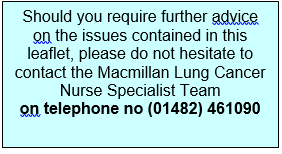- Reference Number: HEY-035/2022
- Departments: Oncology (Cancer Services)
- Last Updated: 1 June 2022
Introduction
This leaflet has been produced to give you general information about the Macmillan Lung Cancer Clinical Nurse Specialist Team.
Your key worker is …………………………………………………………………….
The Macmillan Lung Cancer Clinical Nurse Specialist Team have had training and experience in lung cancer nursing, and specialise in the care and support of people with lung cancer and mesothelioma (a cancer of the thin membrane that lines the chest and abdomen).
What is the function of the Macmillan lung cancer nurse specialist?
The Macmillan Lung Cancer Nurse Specialist works as a key member of the multi-disciplinary team (MDT) involved in your care. You may also hear them referred to as your “key worker”. They can provide expert knowledge in the management of patients with lung cancer and mesothelioma.
How can I help you?
We can provide you with:
- an opportunity to talk through the information that you have been given
- further information and support in finding the information that you may need
- support for you and your family
- a link with other healthcare professionals involved in your care
- specialist nursing advice
- pain and symptom control and management
- advice regarding benefits and entitlements
- advice regarding support at home and in the community
How can you contact me?
The Macmillan Lung Cancer Nurse Specialist Team is based in the Queen’s Centre for Oncology and Hematology at Castle Hill Hospital.
We work Monday to Friday, 8.30am-4.30pm, but not weekends or on bank holidays. We can be contacted on: (01482) 461090. As we are frequently away from the office helping patients, our patient coordinators are happy to answer any general queries or concerns in our absence. Alternatively, there is an answer phone on this number, so please leave a message and we will return your call as soon as we are able to.
Useful addresses and contact numbers:
Cancer Assessment Unit Triage and assessment service includes out of hours: (01482) 468888
Cardiothoracic Macmillan Nurse: (01482) 461630
Macmillan Cancer Support Advice Line: 0808 808 00 00 – www.macmillan.org
Roy Castle Lung Cancer Foundation: 0800 358 7200 – www.roycastle.org
Mesothelioma UK: 0800 169 2409 / www.mesothelioma.uk.com
Macmillan Cancer Information Officer (based in Queen’s Centre for Oncology) – (01482) 461154
This leaflet was produced by the Macmillan Lung Cancer Nurse Specialist Team, Hull and East Yorkshire Hospitals NHS Trust and will be reviewed in July 2025
General Advice and Consent
Most of your questions should have been answered by this leaflet, but remember that this is only a starting point for discussion with the healthcare team.
Consent to treatment
Before any doctor, nurse or therapist examines or treats you, they must seek your consent or permission. In order to make a decision, you need to have information from health professionals about the treatment or investigation which is being offered to you. You should always ask them more questions if you do not understand or if you want more information.
The information you receive should be about your condition, the alternatives available to you, and whether it carries risks as well as the benefits. What is important is that your consent is genuine or valid. That means:
- you must be able to give your consent
- you must be given enough information to enable you to make a decision
- you must be acting under your own free will and not under the strong influence of another person
Information about you
We collect and use your information to provide you with care and treatment. As part of your care, information about you will be shared between members of a healthcare team, some of whom you may not meet. Your information may also be used to help train staff, to check the quality of our care, to manage and plan the health service, and to help with research. Wherever possible we use anonymous data.
We may pass on relevant information to other health organisations that provide you with care. All information is treated as strictly confidential and is not given to anyone who does not need it. If you have any concerns please ask your doctor, or the person caring for you.
Under the General Data Protection Regulation and the Data Protection Act 2018 we are responsible for maintaining the confidentiality of any information we hold about you. For further information visit the following page: Confidential Information about You.
If you or your carer needs information about your health and wellbeing and about your care and treatment in a different format, such as large print, braille or audio, due to disability, impairment or sensory loss, please advise a member of staff and this can be arranged.


